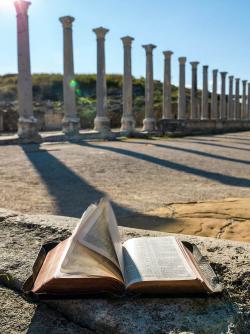Repeating Rome’s Mistakes
As did Rome before it, the United States has steadily declined, and many no longer see it as the greatest nation in the world. Does Bible prophecy predict the fall of America?
Canada’s National Post carried this January 15, 2013 headline: “Lost without a map: Despite a globalized society, university students can’t locate the Atlantic Ocean.” If this were the middle of Manitoba or Kansas (anyone know where those are?) they might have had an excuse, though a lame one—but these were students from Memorial University of Newfoundland, where the Atlantic Ocean could be seen from their dormitory windows.
Sociologist Judith Adler had a hunch that her university students lacked basic geographical knowledge and began testing the proposition. “I used to ask if they could identify France, England or Ireland—which is the background of a lot of students here, or Spain or Portugal, which is important for this part of the world, but I’ve stopped asking that.” Over time, she simplified her questions. “I asked them to indicate where on the map South America is, where Africa is, and Antarctica, the Arctic, and to circle Europe, label Australia and show where Asia is and label the Atlantic, Pacific and Indian Oceans and Mediterranean Sea—and I’ve become much simpler in what I have asked over the years,” Ms. Adler says.
How did her students fare with her questions? “A sizeable proportion of the class would reliably have no idea where the Mediterranean is. Some students would circle Africa and indicate that it’s Europe, and if asked to locate England and Ireland, they would put them in Africa. I have had students that aren’t able to correctly label the Atlantic Ocean, even though we are on it.”
Man-on-the-street interviews in the United States show that Americans are equally ignorant of the real world around them. One would like to think that the answers reported are cherry-picked from the most uninformed—and there is likely some truth to that—but it is doubtful that the questioners must go far to find them. Some confuse states with cities, and when they cannot name their nation’s sitting vice president, one can only imagine what else they don’t know. We now live in the richest information age in history, but also the most ignorant when it comes to understanding where we are, where we came from, and how we got here. Is there any wonder why we have so many “flat-earthers” amongst us?
The late Dr. Roderick C. Meredith made this astute observation: “The way to lower interest in a topic is to place the word history in the title.” Sadly, history and geography are not subjects emphasized in most schools today. Both began to be replaced more than a century ago by the innocuous-sounding social studies. But this was not the innocent change that a naïve public took it for at the time. While it is true that history can be manipulated, geography is much less subjective. Over the decades, geography has increasingly been neglected, and social studies morphed into social issues promoted by radical activists. Any history that is taught today is too often an agenda-driven rewrite of Western history.
Variations on the repeating-history theme appear alongside debates about attribution. Irish statesman Edmund Burke is often misquoted as having said, “Those who don’t know history are destined to repeat it.” Spanish philosopher George Santayana is credited with the aphorism, “Those who cannot remember the past are condemned to repeat it,” while British statesman Winston Churchill wrote, “Those that fail to learn from history are doomed to repeat it” (“History Repeating,” LiberalArts.VT.edu, accessed December 20, 2022).
Does History Matter?
The fall of the Roman Empire is one of the most studied events of history, yet it is little understood by today’s generations. The demise of such a great empire has lessons for America in particular, and for the West in general, because one lesson of history is that power abhors a vacuum. When America falls—as it surely will, unless it changes direction soon—another power will fill the vacuum, and it may not be so benevolent. In fact, it will not be, according to Bible prophecy.
Whole books have been written about the collapse of the Roman Empire, and historians agree that its downfall had no single cause. Instead, it fell because of a series of internal and external forces that over decades pulled the fabric of the Empire apart, ending a power that had held sway for more than a thousand years.
Mass migration from outside the Empire is often cited as a primary cause. “One of the most obvious reasons for the downfall of Rome was the relentless and seemingly endless waves of migration and invasions from the Barbarian tribes that bordered Rome’s northern frontiers. In the early days of the empire, Roman legions were able to repel Barbarian tribes with relative ease, but this started to change towards the end of the 2nd century CE” (“7 Reasons Why Rome Fell,” WorldAtlas.com, November 8, 2022). A particularly destructive migration took place in the late fourth century AD when Eurasian Huns invaded Europe—driving Germanic tribes to seek refuge inside the borders of the Empire. “The Romans grudgingly allowed members of the Visigoth tribe to cross south of the Danube and into the safety of Roman territory” (“8 Reasons Why Rome Fell,” History.com, January 29, 2019).
The parallels between mass migration into the Roman Empire from the north and the literal invasion of illegal immigrants on the U.S. southern border ought to be a wake-up call, but politics is apparently more important than saving the country. In fiscal year 2020 (October through September) there were 458,088 border encounters with undocumented migrants. These were people who were caught or who simply crossed illegally into the country and turned themselves in, claiming asylum. In 2021, this number rose to 1,734,686, and in 2022 to a staggering 2,378,944. In October, the first month of fiscal 2023 (the latest figures available at time of writing), there were 230,678 (“Southwest Land Border Encounters,” CBP.gov, November 14, 2022). And none of these figures take into account known “gotaways”—those who were caught on camera or by other means but were never apprehended—which are estimated at 599,000 for fiscal year 2022 alone (“Border officials count 599,000 ‘gotaway’ migrants in Fiscal Year 2022: source,” FoxNews.com, October 2, 2022). Then there are all the potential unknown border crossings.
This situation goes beyond politics. It strikes at the heart of the question of whether a country can survive with what is clearly an open-border policy.
History.com lists other reasons for Rome’s collapse: overexpansion and military overspending, government corruption and political instability, the spread of Christianity, and the loss of traditional values (History.com). One of those reasons may surprise you. How could Christianity be an empire killer? In a high school and college history book from an earlier age (first published in 1900), Philip Myers explains how nominal-yet-false Christianity contributed to the decline in birthrate and respect for the institution of the Roman family.
Another cause of the decline in population was the singular aversion that the better class of the Romans evinced to marriage. We meet during the period of the empire with a crowd of imperial edicts dealing with this subject. Penalties and bounties, deprivations and privileges, entreaties and expostulations are in turn resorted to by the perplexed emperors, in order to discourage celibacy and to foster a pure and healthy family life. But all was in vain. The marriage state continued to be held in great disesteem…. And Christianity instead of correcting the evil, rather made matters worse; for just now the teachings of the monks were persuading vast multitudes of the superior sanctity of the solitary or the monastic life, and thereby filling the deserts of Egypt and the monasteries of all lands with men who believed they could best live the higher [life] by freeing themselves of all family and social cares and duties (Rome: Its Rise and Fall, pp. 447–448).
America has few men running off into the desert to live a monastic life, but far too many working-age men are sitting on the sidelines instead of going to work. “The job market in the U.S. has remained hot this year despite the Federal Reserve’s best efforts to cool it down, and unemployment is at just 3.7 percent, close to a 50-year low. But part of the population has been silently walking away from work for several decades—well before the COVID-19 pandemic began” (“Men are dropping out of the labor force because they’re upset about their social status, according to a new study,” Fortune, December 7, 2022).
Yes, even before COVID-19, participation in the labor market by men aged 25–54 was a troubling concern for policymakers—and their concern points directly to the health of the family. In 2019—during what has been described as the longest economic expansion in U.S. history, with historically low unemployment—Senator Mike Lee of Utah admitted:
“I’m concerned that if more men can’t find stable, steady work, the result is likely to be fewer marriages, in the first instance, and more divorces, in the second instance….” It’s also likely, he said, that as marriage rates fall, men will feel less of a need to be breadwinners and involved with their children, which in turn would lead to more unemployment and less stable family lives (“Why are men dropping out of the workforce despite a strong economy?,” Deseret News, November 23, 2019).
Manhattan Institute senior fellow Oren Cass agrees that there is a connection between, and a downward spiral developing with, work and the stability of the family unit. When one suffers, so does the other.
Work, he said, brings structure to each and life in general. It offers the mundane but essential disciplines of timeliness and reliability and hygiene as well as the more complex socialization of collaboration and paying attention to others. It requires people to interact and forges shared experiences and bonds. It promotes goal setting and long-term planning, Cass said.
“True, other pursuits can provide these kinds of benefits…” he said. “But sleeping, couch surfing or playing video games does not. And for out-of-work men in particular, such idle activities tend to fill up their time” (Deseret News).
Whatever the causes, low birthrates and disrespect for the institution of the family bring about the same result—a nation in decline. In modern America, Canada, Europe, Russia, and elsewhere, birthrates are at historic lows, well below replacement level, and there is a connection between low birthrates and unchecked illegal immigration.
What Factors Caused the Decline of the Roman Empire—And Are They at Work Today?
“Democratic Sen. Chuck Schumer of New York called on Republicans Wednesday [November 16, 2022] to join in passing a pathway to citizenship for ‘all undocumented’ in the United States, citing the fact that Americans were ‘not reproducing’” (“Schumer Says US Needs More Immigration Because Americans Are ‘Not Reproducing,’” DailyCaller.com, November 16, 2022).
Why are Americans and others “not reproducing”? One obvious reason is unrestricted abortion, a major platform on which Sen. Schumer’s party proudly and arrogantly ran in the 2022 midterm elections. In the last 50 years, Americans have aborted tens of millions of their children. As Tomorrow’s World writer Wallace G. Smith reminded us in his January 2022 article “Seven Lies About Abortion,” the womb is unmistakably the most dangerous place for an innocent American child.
World Atlas lists seven causes for the decline and fall of the Roman Empire:
- Migration and Barbarian Invasion
- Corruption
- Climate Change and Famine
- Disloyal and Ineffective Militaries
- Civil Wars
- Economic Destitution
- Weak Leadership
This same source then gives a summary:
The fall of the Western Roman Empire can teach humans many things about societal collapse and regression. Most shortcomings of a civilization in decline come from within rather than without. Incompetent leaders, government corruption, a weak economy, and social dissolution all contributed to the downfall of Rome. Considering how deep and long-lasting these issues were for the Romans it is surprising that Rome did not fall sooner (WorldAtlas.com).
Do any of these problems sound familiar? What about a weak economy? Surely that is not a problem for America! Or is it? That probably depends on whether one considers a national debt of $31,000,000,000,000—that’s 31 trillion dollars—a problem. Add to this Americans’ personal debt, which is also out of control, especially since inflation set in—another self-inflicted wound. The government offered free money, which people were all too happy to receive.
Inflation caused by too much “free” money is more than an American problem. As Nicholas Clairmont wrote for BigThink.com, “History shows that both those who do not learn history and those who do learn history are doomed to repeat it.” He went on to explain, “According to Santayana’s philosophy, history repeats. The phrasing itself certainly is catchy. It’s a big one, not only because it is so common, but also because if it is true and if history, driven by human nature, is ugly (hint: it is), then this saying ought to guide our public and private policy” (“‘Those Who Do Not Learn History Are Doomed To Repeat It.’ Really?,” BigThink.com, July 31, 2013).
More importantly, this understanding ought to guide our public and private behavior, because our behavior ultimately influences government policy, especially in democracies. And this is where another lesson of history must be considered. As Clairmont wrote, it is not history that guides nations, but human nature—a fact that brings us to a different kind of history book.
Unlike the citizens of Roman Catholic countries where people were historically discouraged from reading the Bible for themselves, the British-descended and American peoples, at least until recent times, were generally encouraged to read from this greatest of all books. In its pages, humanity is given a choice. That choice is articulated in various ways at different times, but it is the same choice: “I call heaven and earth as witnesses today against you, that I have set before you life and death, blessing and cursing; therefore choose life, that both you and your descendants may live” (Deuteronomy 30:19).
The Bible is fundamentally a history book. It shows the instructions given by a loving Creator, it records how mankind has rejected those instructions, and it illustrates the tragic results of that rejection. It also reveals history in advance—what most people think of as prophecy. The prophets themselves remind us of God’s beneficial interventions on behalf of His obedient people, but also reveal the results of their disobedience. One of the Bible’s clear lessons is that when people hurt badly enough, they often turn to God for relief—only to turn back to their old ways once relief comes. This is like the proverbial soldier’s prayer in the foxhole, forgotten once the crisis passes.
Will this generation of Americans, Britons, Canadians, Australians, and New Zealanders learn from the past? What about the French, Belgians, Dutch, and Swiss? It is difficult to see how any of these nations can learn from the past when their peoples don’t know the past. Perhaps only the Jews know their past, who they are, and where they came from. Yet even they, as Clairmont suggests, seem likely to repeat their painful history.
Lessons from the Bible—God Will Judge His People
One history lesson found in the pages of the Bible is that of the ancient Israelites’ golden calf. After God brought a slave people out of bondage by great and powerful miracles that could not be rationally explained away, they turned right back into idolatry when Moses was away for a mere 40 days. This was apparently long enough for the people to start pressuring Aaron, the one left in charge in Moses’ absence, to make a golden calf idol and hold a licentious festival to celebrate it. In the aftermath, God commanded Moses, “Now therefore, go, lead the people to the place of which I have spoken to you. Behold, My Angel shall go before you. Nevertheless, in the day when I visit for punishment, I will visit punishment upon them for their sin” (Exodus 32:34).
Author Dennis Prager makes this observation about this verse and our limited understanding of the God of the Bible: “In modern times, with its psychological and therapeutic mindset, many people tend to think of God as a loving therapist Who is always there to listen, to understand, and most importantly, not to judge us. [And here is the historical lesson:] This verse reminds us that above all, the God of the Torah is a moral judge. He demands certain behavior, and holds people accountable when they fail to live accordingly” (The Rational Bible: Exodus, p. 454).
The Bible is the greatest and most important history book ever written, but as with history in general, far too many in this generation are devoid of historical perspective. Winston Churchill summed it up in one sentence: “Want of foresight, unwillingness to act when action would be simple and effective, lack of clear thinking, confusion of counsel until the emergency comes, until self-preservation strikes its jarring gong, these are the features which constitute the endless repetition of history” (Winston S. Churchill, His Complete Speeches, 1897–1963, ed. Robert Rhodes James, vol. 6, p. 5592).
The British-descended and American peoples have forgotten who they are, and they are repeating the grave mistakes of the past. To learn about the history of these peoples, order a free copy of one of the most remarkable works we have ever published, The United States and Great Britain in Prophecy. It is—and don’t let this word scare you off—history you need to know.






